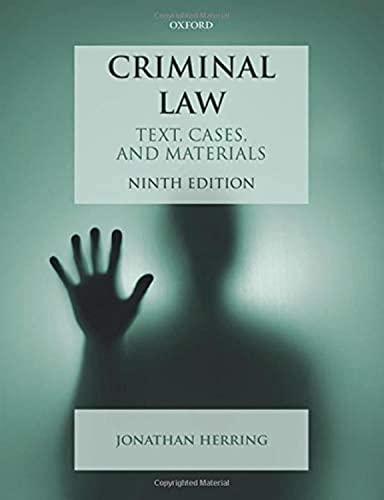Question
1. (10 POINTS) Janice and Margaret are reporters for the Wall Street Journal. They have confidential, anonymous information that the officers of Silicon Valley Bank,
1. (10 POINTS) Janice and Margaret are reporters for the Wall Street Journal. They have confidential, anonymous information that the officers of Silicon Valley Bank, a large bank in Northern California, violated federal law in how they made investments with customer funds. The value of the bank dropped significantly in February 2023 possibly because of the unlawful and risky investment strategies.
Janice makes several calls to the bank, identifying herself as a reporter, and gets nowhere. Janice and Margaret decide on a plan: they will visit the bank, say they are government investigators, and interview the main bank officers. They do this and even make up fake badges and IDs for themselves. A bank officer, thinking she is required to speak to them because they are government agents, gives them an interview. When the reporters show up, Margaret secretly hides her cell phone in her purse, which is set to record the whole conversation. She does not tell the officer of this recording. They ask the officer many questions and get answers, some of which admit the bank made poor investment decisions that may have violated the law.
The reporters write up a story under the banner headline "SVB Officer Admits Criminal Investment Scheme." Their employer, theWall Street Journal,is considering publishing the story. The story includes extensive direct quotes from the officer, taken from Margaret's recording.
a. (5 POINTS) You are a lawyer for theJournal. The editors come to you and ask you to review the article, and to let them know if the story presents legal problems for theJournalor the reporters. Identify all possible legal liabilities the Journal and the reporters could face if they publish this story. Analyze these legal issues and provide advice to the editors about whether you believe publication is worth the risks it presents-- if any. Write up a memo to the editors with your analysis and recommendation.
b. (5 POINTS) You are the managing editor of theJournal. You are the chief editor who considers ethical problems in publications. The other editors come to you and ask if publishing this article as is ethical, using all the information obtained by the reporters and the way they obtained it. Provide a written response to them, citing and discussing specific provisions of the Code of Ethics of the Society of Professional Journalists (SPJ Code) in your discussion. (By "specific provisions, I mean the specific bullet points in the Code, not just the broad principles like "Minimize Harm." Get down into the more specific points of the Code.) Also, discuss whether publishing this article would be consistent with the following theories of ethical behavior: utilitarianism, moral relativism, and categorical imperative.
2. (5 POINTS) You are a reporter for CNN. You are investigating a story about how the Securities and Exchange Commission (SEC), a federal agency, gives preference to certain large banks in how it investigates allegations of improper bank investments. You make a call to the SEC information officer, who says you can't have any information on its investigations of banks. They do not give a reason. You believe the SEC is wrong in denying access to these records. What law should you make a formal request under? How should you make that request? What exemption is the SEC likely to rely on if it denies your request under the law?
3. (10 POINTS) You are reporter for a local Fresno broadcast station. One year ago you wrote a story about a criminal investigation of a large theft of product from a local Home Depot store. The station broadcast the story and you were the on-air reporter for it. In the story, you said you had interviewed a person who said she was part of the theft ring for this incident. She identified the other participants. Before she spoke to you about the crime, she asked you to promise you would never disclose her identity. You agreed and promised to keep her identity confidential. Today you are served you with a subpoena to show up at a an upcoming trial of a person who is charged with committing this crime. The subpoena says it was issued by the Superior Court of California, County of Fresno, which is where this trial is proceeding. The subpoena asks for your testimony and all materials you relied on in doing the story a year ago.
a. If you want to fight this subpoena, do you have legal grounds to do so under the law? Analyze your rights under the law you decide applies here. If the subpoena is coming from a criminal defendant who says you have information about a witness who can say this defendant was not a participant in the robbery, does that make a difference in deciding if you will have to testify? Can the court lawfully require you to identify your confidential source?
b. If the court does require you to answer this question, should you identify the source under the ethical guidelines of the SPJ Code, or refuse? Why? Explain.
Step by Step Solution
There are 3 Steps involved in it
Step: 1

Get Instant Access to Expert-Tailored Solutions
See step-by-step solutions with expert insights and AI powered tools for academic success
Step: 2

Step: 3

Ace Your Homework with AI
Get the answers you need in no time with our AI-driven, step-by-step assistance
Get Started


